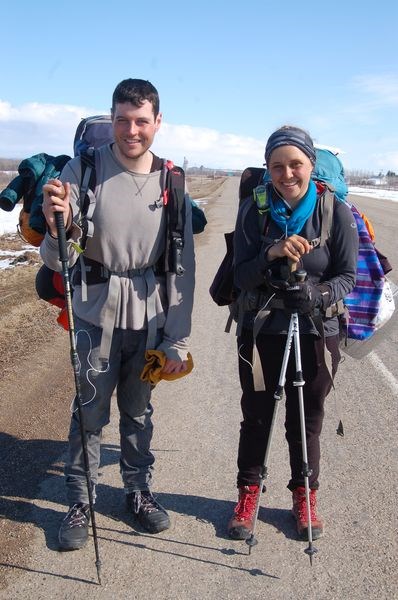A woman whose goal is to walk across Canada using, as much as possible, the Trans Canada Trail, and a friend accompanying her part of the way, were in Kamsack over the Easter weekend.
Sarah Jackson of Edmonton, who left Victoria, B.C. on foot last June, said she plans to arrive in Newfoundland this autumn. Since Cochrane, Alta., she has been accompanied by Stephen Wynnyk who plans to walk with her to Winnipeg.
The hike is not new to Wynnyk who, as a teenager, had hiked across northern Spain with his father.
Jackson and Wynnyk arrived in Canora on March 21 which was the 184th day of Jackson’s journey. She said that she tries to hike at about five kilometres per hour for four to 10 hours per day. She thinks the longest stretch she covered in one day was 43.5 kilometres. She has GPS tracking on her so her parents will always know where she is.
In Saskatchewan, a lot of rural roadways were used, and not highways. As a hiker, Jackson said that was what she liked about Saskatchewan. The rural roads allowed her to see a side of Saskatchewan she never would have seen from the highway. One of her most memorable experiences was crossing the North Saskatchewan River at the Wingard Crossing. That crossing is normally done in the summer months by ferry, but she was able to make an ice crossing.
Having Sarah Jackson pass through the area is still rather new but more trail enthusiasts are expected as 2017 approaches, said Kristen Gabora of Canora, co-ordinator for the Saskatchewan portion of the trail.
Right now, she is likely only the third person to attempt the feat, Gabora said. However, many have passed through the area while hiking or cycling significant portions of the trail.
When Gabora became the co-ordinator in November 2013, only 34 per cent of the trail was complete in Saskatchewan. That figure increased to 71 per cent last summer and it will be substantially higher when calculations are made this summer.
As of June of last year, the three provinces with the most trail to connect were: Nova Scotia, 38 per cent done; New Brunswick, 61 per cent done; and Alberta, 59 per cent done.
Gabora referred to Jackson as “a true role model for youth. She’s doing something outside the box and the beauty of what she’s doing is that she’s doing it for herself.”
Jackson said there are some challenging aspects to the hike, like carrying a backpack that often exceeds 60 pounds. She said that winter was a bit of challenge, but being forever optimistic, she said that because the winter of 2015-16 was an El Nino winter, the temperatures were much more mild than usual.
Jackson said she tries not to have any expectations before reaching a place. She likes to experience it.
Along most of the way, she has had family members or friends walk with her. For the final leg, she hopes to have her parents join her – and they can offer a ride back.
People have been very interested in her hike and many strangers have stopped along the roads to ask what she’s doing. She did start a website where she posts entries about where she has visited.
It is the people that have been the most amazing, she said. Everybody has been so welcoming and many have offered a warm place to spend a night.
Every day is so different and she has experienced many places she never knew about. “Every step east is exciting – it’s all new.”
The provincial and national parks are beautiful and the Qu’Appelle Valley has to be the most beautiful site in Saskatchewan, Jackson said. Saskatchewan is definitely not as flat as most people are led to believe.
Jackson said she prefers the rural hiking because urban hiking is always a hassle. In the rural areas, it is possible to set up camp almost anywhere.
As she moved east, Jackson said what she can’t wait to see most is the Canadian Shield and the Great Lakes.
Seeing the beautiful landscapes of Canada and meeting so many wonderful people exceeds by far any of the challenges, she said.
Jackson and Wynnyk came through Yorkton, followed the trail to Good Spirit Lake and then to Canora. They left Canora following the trail towards Veregin, on to Kamsack and to the Manitoba border.
Jackson said she hopes to dip her foot in to the Atlantic Ocean on the east coast of Newfoundland before the first snowfall of the winter of 2016-17.
The Trans Canada Trail, which was originally scheduled to be finished in July 2000, is about 80 per cent complete. With the country about to celebrate its 150th birthday, the new goal is to have the trail completed in time for the 2017 celebrations, which will also be the 25th anniversary of the trail. The final trail will be about 24,000 kilometres, but about 6,000 kilometres still need to be completed.




